Fat Hungarian stage and film comedian Károly Huszár (1884–1942 or 1943) was the most popular slapstick star of the Hungarian silent era. He later worked in both Germany and Hollywood, also using the names Karl Huszár-Puffy and Charles Puffy. He played minor roles in feature films and was the star of a series of slapstick shorts for Universal. Besides his film work, he frequently appeared on stage, mostly as a comedian.
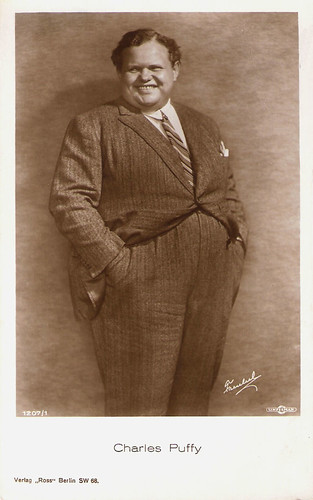
German postcard by Ross Verlag, no. 1207/1, 1927-1928. Photo: Roman Freulich / Unfilman (Universal).
Károly Huszár or Charles Puffy was born as Károly Hochstadt (according to some sources: Hochstein) in Budapest, Austria-Hungary (now Hungary) in 1884. At 16, the still-thin Hochstadt became the long-distance swimming champion of Germany. He studied acting at the Országos Színészegyesület Színészképző Iskoláját (National Actor Association's Actor Training School).
Then he worked for 16 years on stage in Budapest, where he became a star of the cabarets, and also wrote some comedies. He started his film career as Károly Huszár in such silent shorts as Víg egyveleg, avagy Pufi és társai/Merry Pompi, or Pufi and his companions (Kornél Tábori, 1914) and Pufi cipöt vesz/Puffy Buys Shoes (Kornél Tábori, 1914). In these films, he played a character called 'Pufi'. It became his nickname and stage name. ‘Pufi’ means ‘Fatty’ in Hungarian and indeed the thin swimming champion had a legendary appetite and had gained quite some pounds. In his prime Pufi weighed ca. 290 pounds.
In 1917 he worked with director Michael Curtiz (then still Mihály Kertész) at Tavasz a télben/Spring in Winter (1917), and Az Ezredes/The Colonel (1917) with the young Béla Lugosi. That year he also worked with another famous director-to-be, Alexander Korda (as Korda Sándor), at Szent Péter esernyöje/St. Peter's Umbrella (1917) with Victor Varconi.
In 1920 he made his first film in Germany, Putschliesel (Erich Schönfelder, 1920) featuring Ossi Oswalda. He was featured as Karl Huszar-Puffy. The next year, such films followed as Der Mord ohne Täter/The Murder without Offender (Ewald André Dupont, 1921), the serial Der Mann ohne Namen/The Man Without a Name (Georg Jacoby, 1921) featuring Harry Liedtke, and Der Roman eines Dienstmädchens/The Novel of a Handmaid (Reinhold Schünzel, 1921) with Liane Haid.
That year, he worked twice with director Friedrich Zelnik (later Fredric Zenik) and his star-producer Lya Mara, on Miss Beryll... die Laune eines Millionärs/Miss Beryll, the Mood of a Millionaire (Friedrich Zelnik, 1921) and on Aus den Memoiren einer Filmschauspielerin/From the Memoirs of a Film Actress (Friedrich Zelnik, 1921). However, the most famous director he worked with that year was Fritz Lang. Puffy appeared as the emperor of China in the fantasy Der müde Tod/Destiny (Fritz Lang, 1921).
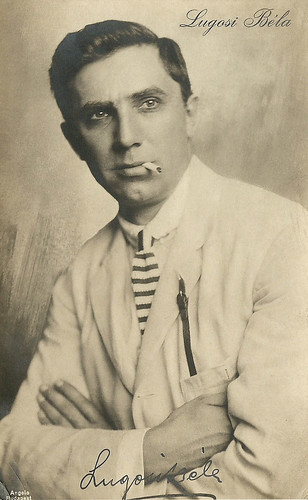
Béla Lugosi. Hungarian postcard. Photo: Angelo, Budapest. Collection: Didier Hanson.
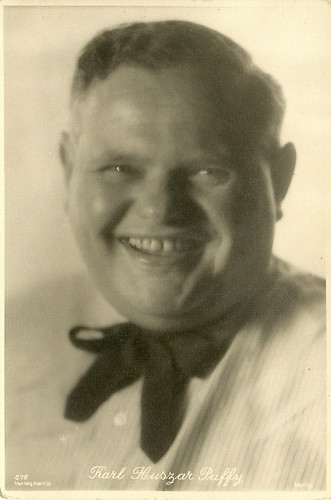
Vintage postcard by Verlag Hartiq, no. 576. Photo by Hartiq. Collection: Didier Hanson.
In 1922 Károly Huszár made his American debut in Arctic Adventure (Chester Withey, 1922). That year he also had a part in Fritz Lang’s classic crime thriller Dr. Mabuse, der Spieler - Ein Bild der Zeit/Dr. Mabuse: The Gambler (1922) starring Rudolf Klein-Rogge as arch-criminal Dr. Mabuse. He also appeared opposite film legend Henny Porten in Sie und die Drei/She and the Three (Ewald André Dupont, 1922).
In 1923, Universal offered him a contract to make a series of comedy shorts in Hollywood under the name Charles Puffy. He starred in some 26 shorts between 1924 and 1927 including City Bound (Richard Smith, 1925), Unwelcome (Richard Smith, 1925) and Ah! Gay Vienna! (Harry Sweet, 1927).
He also appeared in minor roles in such feature films as Open All Night (Paul Bern, 1924) starring Viola Dana and Jetta Goudal, the melodramas The Rose of Paris (Irving Cummings, 1924) featuring Mary Philbin as a poor French orphan, and The Love Thief (John McDermott, 1926).
In Hollywood, Puffy also worked with several European directors. He played supporting parts in Benjamin Christensen’s melodrama Mockery (1927) starring Lon Chaney, in Ewald André Dupont’s comedy Love Me and the World Is Mine (1927) and in Alexander Korda’s comedy The Private Life of Helen of Troy (1927).
One of his most interesting Hollywood films is The Man Who Laughs (1928) directed by the German Expressionist filmmaker Paul Leni. The film is an adaptation of Victor Hugo's novel of the same name and stars Conrad Veidt as Gwynplaine and Mary Philbin as the blind Dea. Universal put over $1,000,000 into The Man Who Laughs, an extremely high budget for an American film at the time.
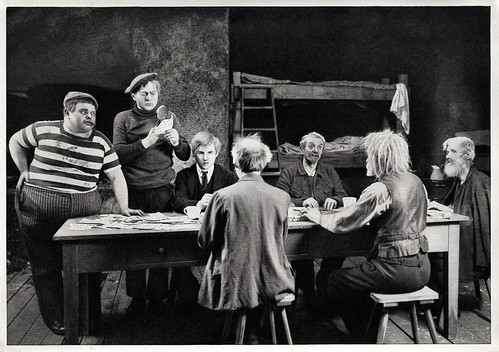
German collectors card by Ross Verlag in the series Vom Werden deutscher Filmkunst - Der Stumme Film, picture no. 94, group 40. Photo: Ufa. Publicity still with Károly Huszár (left) and Rudolf Klein-Rogge (second from left) in Dr. Mabuse, der Spieler/Dr. Mabuse, King of Crime (Fritz Lang, 1922). Caption: Dr. Mabuse, who prints false money, lets the false notes be sorted by blind people who can not betray him.

Conrad Veidt. German postcard by Ross Verlag, Berlin, no. 1426/2, 1927-1928. Photo: Vaida M. Pál, Budapest.
At the time of the introduction of the sound film, Károly Huszár returned to Germany. He appeared twice in minor roles opposite Marlene Dietrich, in Ich küsse Ihre Hand, Madame/I Kiss Your Hand Madame (Robert Land, 1929), and in her breakthrough film Der blaue Engel/The Blue Angel (Josef von Sternberg, 1930) in which Puffy played the club owner.
After several such bit roles, Puffy played a leading part in the comedy Der nächtse Bitte/Next Please (Erich Schönfelder, 1930) opposite Adele Sandrock. However, in the following years, he was seen only in supporting parts.
Károly Huszár reunited with Alexander Korda for Die Männer um Lucie/The Men around Lucie (Alexander Korda, 1931) with Liane Haid.
In 1933, after the Nazis came to power, he returned to Hungary, where he continued to play supporting parts. Among these Hungarian films are Pardon, tévedtem/Romance in Budapest (Steve Sekely, Géza von Bolváry, 1933) with Franziska Gaál and Paul Hörbiger, Helyet az öregeknek/Room for the Aged (Béla Gaál, 1934) with Szõke Szakáll, and Kleine Mutti/Little Mother (Hermann Kosterlitz a.k.a. Henry Koster, 1935) featuring Franziska Gaál. His final Hungarian film was Nehéz apának lenni/It's Hard to be a Dad (Márton Keleti, 1938).
Károly Huszár’s death place and date are still unconfirmed. Puffy was Jewish and decided to flee Hungary when the Holocaust started. About what then happened the sources differ. A source mentions that Károly Huszár and his wife tried to get into the United States in 1941. Some sources say that he died in Tokyo, Japan in 1942. Others that his train was stopped by the Soviet army and he was imprisoned in a Gulag labour camp in Karaganda, Kazakhstan where he performed in the camp theatre company. Reportedly he died there from diphtheria in 1943, but other sources say he and his wife died of starvation.
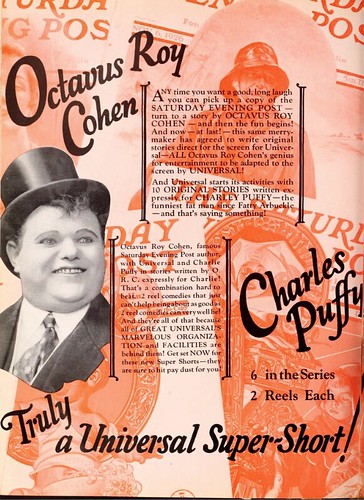
Advertisement 'Octavus Roy Cohen, Charles Puffy, Truly a Universal Super Shot'. Collection: Stonemason@Flickr.
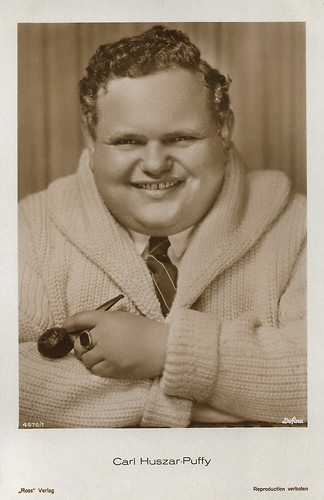
German postcard by Ross Verlag, no. 4570, 1929-1930. Photo: Defina.
Sources: Hans J. Wollstein (AllMovie - Page now defunct), Jan-Christopher Horak (Film History), The Missing Link (Now defunct), Wikipedia (German and English) and IMDb.
This post was last updated on 3 November 2024.

German postcard by Ross Verlag, no. 1207/1, 1927-1928. Photo: Roman Freulich / Unfilman (Universal).
290 pounds
Károly Huszár or Charles Puffy was born as Károly Hochstadt (according to some sources: Hochstein) in Budapest, Austria-Hungary (now Hungary) in 1884. At 16, the still-thin Hochstadt became the long-distance swimming champion of Germany. He studied acting at the Országos Színészegyesület Színészképző Iskoláját (National Actor Association's Actor Training School).
Then he worked for 16 years on stage in Budapest, where he became a star of the cabarets, and also wrote some comedies. He started his film career as Károly Huszár in such silent shorts as Víg egyveleg, avagy Pufi és társai/Merry Pompi, or Pufi and his companions (Kornél Tábori, 1914) and Pufi cipöt vesz/Puffy Buys Shoes (Kornél Tábori, 1914). In these films, he played a character called 'Pufi'. It became his nickname and stage name. ‘Pufi’ means ‘Fatty’ in Hungarian and indeed the thin swimming champion had a legendary appetite and had gained quite some pounds. In his prime Pufi weighed ca. 290 pounds.
In 1917 he worked with director Michael Curtiz (then still Mihály Kertész) at Tavasz a télben/Spring in Winter (1917), and Az Ezredes/The Colonel (1917) with the young Béla Lugosi. That year he also worked with another famous director-to-be, Alexander Korda (as Korda Sándor), at Szent Péter esernyöje/St. Peter's Umbrella (1917) with Victor Varconi.
In 1920 he made his first film in Germany, Putschliesel (Erich Schönfelder, 1920) featuring Ossi Oswalda. He was featured as Karl Huszar-Puffy. The next year, such films followed as Der Mord ohne Täter/The Murder without Offender (Ewald André Dupont, 1921), the serial Der Mann ohne Namen/The Man Without a Name (Georg Jacoby, 1921) featuring Harry Liedtke, and Der Roman eines Dienstmädchens/The Novel of a Handmaid (Reinhold Schünzel, 1921) with Liane Haid.
That year, he worked twice with director Friedrich Zelnik (later Fredric Zenik) and his star-producer Lya Mara, on Miss Beryll... die Laune eines Millionärs/Miss Beryll, the Mood of a Millionaire (Friedrich Zelnik, 1921) and on Aus den Memoiren einer Filmschauspielerin/From the Memoirs of a Film Actress (Friedrich Zelnik, 1921). However, the most famous director he worked with that year was Fritz Lang. Puffy appeared as the emperor of China in the fantasy Der müde Tod/Destiny (Fritz Lang, 1921).

Béla Lugosi. Hungarian postcard. Photo: Angelo, Budapest. Collection: Didier Hanson.

Vintage postcard by Verlag Hartiq, no. 576. Photo by Hartiq. Collection: Didier Hanson.
Charles Puffy
In 1922 Károly Huszár made his American debut in Arctic Adventure (Chester Withey, 1922). That year he also had a part in Fritz Lang’s classic crime thriller Dr. Mabuse, der Spieler - Ein Bild der Zeit/Dr. Mabuse: The Gambler (1922) starring Rudolf Klein-Rogge as arch-criminal Dr. Mabuse. He also appeared opposite film legend Henny Porten in Sie und die Drei/She and the Three (Ewald André Dupont, 1922).
In 1923, Universal offered him a contract to make a series of comedy shorts in Hollywood under the name Charles Puffy. He starred in some 26 shorts between 1924 and 1927 including City Bound (Richard Smith, 1925), Unwelcome (Richard Smith, 1925) and Ah! Gay Vienna! (Harry Sweet, 1927).
He also appeared in minor roles in such feature films as Open All Night (Paul Bern, 1924) starring Viola Dana and Jetta Goudal, the melodramas The Rose of Paris (Irving Cummings, 1924) featuring Mary Philbin as a poor French orphan, and The Love Thief (John McDermott, 1926).
In Hollywood, Puffy also worked with several European directors. He played supporting parts in Benjamin Christensen’s melodrama Mockery (1927) starring Lon Chaney, in Ewald André Dupont’s comedy Love Me and the World Is Mine (1927) and in Alexander Korda’s comedy The Private Life of Helen of Troy (1927).
One of his most interesting Hollywood films is The Man Who Laughs (1928) directed by the German Expressionist filmmaker Paul Leni. The film is an adaptation of Victor Hugo's novel of the same name and stars Conrad Veidt as Gwynplaine and Mary Philbin as the blind Dea. Universal put over $1,000,000 into The Man Who Laughs, an extremely high budget for an American film at the time.

German collectors card by Ross Verlag in the series Vom Werden deutscher Filmkunst - Der Stumme Film, picture no. 94, group 40. Photo: Ufa. Publicity still with Károly Huszár (left) and Rudolf Klein-Rogge (second from left) in Dr. Mabuse, der Spieler/Dr. Mabuse, King of Crime (Fritz Lang, 1922). Caption: Dr. Mabuse, who prints false money, lets the false notes be sorted by blind people who can not betray him.

Conrad Veidt. German postcard by Ross Verlag, Berlin, no. 1426/2, 1927-1928. Photo: Vaida M. Pál, Budapest.
Holocaust
At the time of the introduction of the sound film, Károly Huszár returned to Germany. He appeared twice in minor roles opposite Marlene Dietrich, in Ich küsse Ihre Hand, Madame/I Kiss Your Hand Madame (Robert Land, 1929), and in her breakthrough film Der blaue Engel/The Blue Angel (Josef von Sternberg, 1930) in which Puffy played the club owner.
After several such bit roles, Puffy played a leading part in the comedy Der nächtse Bitte/Next Please (Erich Schönfelder, 1930) opposite Adele Sandrock. However, in the following years, he was seen only in supporting parts.
Károly Huszár reunited with Alexander Korda for Die Männer um Lucie/The Men around Lucie (Alexander Korda, 1931) with Liane Haid.
In 1933, after the Nazis came to power, he returned to Hungary, where he continued to play supporting parts. Among these Hungarian films are Pardon, tévedtem/Romance in Budapest (Steve Sekely, Géza von Bolváry, 1933) with Franziska Gaál and Paul Hörbiger, Helyet az öregeknek/Room for the Aged (Béla Gaál, 1934) with Szõke Szakáll, and Kleine Mutti/Little Mother (Hermann Kosterlitz a.k.a. Henry Koster, 1935) featuring Franziska Gaál. His final Hungarian film was Nehéz apának lenni/It's Hard to be a Dad (Márton Keleti, 1938).
Károly Huszár’s death place and date are still unconfirmed. Puffy was Jewish and decided to flee Hungary when the Holocaust started. About what then happened the sources differ. A source mentions that Károly Huszár and his wife tried to get into the United States in 1941. Some sources say that he died in Tokyo, Japan in 1942. Others that his train was stopped by the Soviet army and he was imprisoned in a Gulag labour camp in Karaganda, Kazakhstan where he performed in the camp theatre company. Reportedly he died there from diphtheria in 1943, but other sources say he and his wife died of starvation.

Advertisement 'Octavus Roy Cohen, Charles Puffy, Truly a Universal Super Shot'. Collection: Stonemason@Flickr.

German postcard by Ross Verlag, no. 4570, 1929-1930. Photo: Defina.
Sources: Hans J. Wollstein (AllMovie - Page now defunct), Jan-Christopher Horak (Film History), The Missing Link (Now defunct), Wikipedia (German and English) and IMDb.
This post was last updated on 3 November 2024.
1 comment:
I was fascinated by that photo of Bella Lugosi. What a good looking fellow--what a fascinating history.
Post a Comment